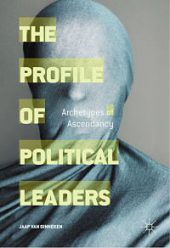Indexes - all Resources
The profile of political leaders: archetypes of ascendancy (2016)
“In our choice of, and support for, leaders, we still seem to be guided by unconscious or instinctive preferences.” Jaap van Ginneken, former Associate Professor, University of Amsterdam Pub: Springer From the publisher’s website: “By analysing a wide range of empirical research into leadership, this book provides a composite portrait of frequent characteristics, such as personality and demeanour, t...
Written by: Van Ginneken, Jap.
Read moreToo much of a good thing? (2016)
A personal view of recent political events as seen through the lens of hubris and ‘the intoxicating effects of power’. (Another in an occasional series of contributions from friends of the Daedalus Trust.) Eugene Sadler-Smith, B.Sc. Ph.D. FRSA FCIPD. Professor of Organizational Behaviour, Surrey Business School Society seeks out leaders who can take risks, exercise and exert influence, are ambitious and deter...
Written by: Daedalus admin
Read moreBehavioral issues in the practical application of scenario thinking: Cognitive biases, effective group facilitation and overcoming business-as-usual thinking. (2016)
Participants’ cognitive biases can both help and hinder scenario thinking: but expert facilitation can challenge and attenuate individuals’ overconfidence. Stephanie Bryson, Megan Grime, Adarsh Murthy and George Wright; Strathclyde Business School. Chapter in Behavioral Operational Research, edited by Kunc, M., Malpass, J., & White, L., published by Springer. “(The authors) discuss and analyse the use of sce...
Written by: Bryson, Stephanie; Grime, Megan; Murthy, Adarsh; & Wright, George.
Read more
Chilcot’s lessons. (2016)
"The Chilcot report (into the war in Iraq) is … also a study into how decision-making can go wrong. Here are nine lessons (from Chilcot) for investors. Chris Dillow. Investor Chronicle 7 July 2016. Image: Warwick Page, Getty Images First, beware of peer pressure. ... while loyalty to one's friends is a virtue, it can lead us to make poor decisions.... For example, Hans Hvide has found that...
Written by: Dillow, Chris.
Read moreWhat decision makers can learn from Blair’s failures. (2016)
"Iraq war shows how an inner circle that becomes a cabal will confirm what CEOs think they know." Andrew Hill. ft.com 11 July 2016. It should come as no surprise that the uniquely perilous situation described in the (Chilcot report on the Iraq war) has parallels in, and lessons for, the corporate world. (Chilcot’s) report advocates wider and deeper discussion in cabinet and committees, separation of risk assessments ...
Written by: Hill, Andrew; Financial Times, The.
Read more
The Chilcot Report: Iraq’s grim lessons. (2016)
Then UK prime minister Tony Blair, "is not a liar and a war criminal (as many contend), but a man steered by a fatal combination of hubris, wishful thinking and moral fervour." The Economist 6 July 2016 “The picture (that Chilcot's report) paints, for all the familiarity of its main elements, is a devastating one of individual and institutional failure. The verdict on Tony Blair, Britain’s prime minister at the time, is not tha...
Written by: Economist, The.
Read moreAnti-hubris toolkit taking shape at Surrey
A practical ‘anti-hubris toolkit’ is taking shape in the UK at Surrey Business School’s Business Insights Lab. It’s an initiative founded on the belief that while academic research into the nature and origins of hubristic leadership in business is important, there’s an urgent need to develop anti-hubris tools “so that the phenomenon might be anticipated, identified and mitigated in advance of any crises it might precipitate.” ...
Written by: Daedalus admin
Read moreAntisocial personality disorder and pathological narcissism in prolonged conflicts and wars of the 21st Century. (2016)
“…once in power, a leader with an Antisocial Personality Disorder (ASPD) thrives on continuing conflict and never seeks peace." Frederick M. Burkle, Jr, MD, MPH, DTM, FAAP, FACEP. Harvard Humanitarian Initiative, Harvard School of Public Health; Senior International Public Policy Scholar, Woodrow Wilson International Center for Scholars, Washington, DC; National Academy of Medicine, Washington, DC. Disaster Medicine and Publ...
Written by: Burkle, Frederick M.
Read moreTrump’s 257 self-references in speech may suggest hubris. (2016)
In his 45 minute speech announcing his presidential candidacy, Donald Trump used 'I' a total of 195 times, 'my' or 'mine' 28 times, 'me' 22 times and 'I’ve' or 'I’d' 12 times, a grand total of 257 self-references which could be an indication of hubris. The observation was made by Vita Akstinaite addressing a workshop at Ashridge Business School’s recent ‘Hubris in the Coaching Relationship’ conference. (A report on proceedings at the...
Written by: Akstinaite, Vita.
Read moreWhat kind of leaders do people love? (2016)
….To believe one’s local leadership style is the only way to success is to embrace the narcissistic tendencies Freud warned us about. Michael Sanger, Hogan Assessment Systems Tomas Chamorro-Premuzic, Hogan CEO, Professor of Business Psychology at University College London & Columbia University. Published in HQAsia, 27 May 2016 What kind of leaders do people love? Ones that look like them. As Freud noted, people ...
Written by: Sanger, Michael & Chamorro-Premuzic, Tomas.
Read more












